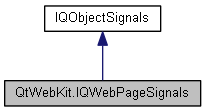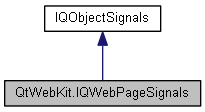|
Qyoto
4.0.5
Qyoto is a C# language binding for Qt
|
|
Qyoto
4.0.5
Qyoto is a C# language binding for Qt
|


| void QtWebKit.IQWebPageSignals.ApplicationCacheQuotaExceeded | ( | QWebSecurityOrigin | origin, |
| ulong | defaultOriginQuota | ||
| ) |
This signal is emitted whenever the web site is asking to store data to the application cache database databaseName and the quota allocated to that web site is exceeded.
| void QtWebKit.IQWebPageSignals.ContentsChanged | ( | ) |
This signal is emitted whenever the text in form elements changes as well as other editable content.
This function was introduced in Qt 4.5.
See also contentEditable, modified, QWebFrame::toHtml(), and QWebFrame::toPlainText().
| void QtWebKit.IQWebPageSignals.DatabaseQuotaExceeded | ( | QWebFrame | frame, |
| string | databaseName | ||
| ) |
This signal is emitted whenever the web site shown in frame is asking to store data to the database databaseName and the quota allocated to that web site is exceeded.
This function was introduced in Qt 4.5.
See also QWebDatabase.
| void QtWebKit.IQWebPageSignals.DownloadRequested | ( | QNetworkRequest | request | ) |
This signal is emitted when the user decides to download a link. The url of the link as well as additional meta-information is contained in request.
See also unsupportedContent().
| void QtWebKit.IQWebPageSignals.FeaturePermissionRequestCanceled | ( | QWebFrame | frame, |
| QWebPage.Feature | feature | ||
| ) |
void QWebPage::featurePermissionRequested ( QWebFrame * frame, QWebPage::Feature feature ) [signal]
| void QtWebKit.IQWebPageSignals.FeaturePermissionRequested | ( | QWebFrame | frame, |
| QWebPage.Feature | feature | ||
| ) |
bool QWebPage::findText ( const QString & subString, FindFlags options = 0 )
Finds the specified string, subString, in the page, using the given options.
If the HighlightAllOccurrences flag is passed, the function will highlight all occurrences that exist in the page. All subsequent calls will extend the highlight, rather than replace it, with occurrences of the new string.
If the HighlightAllOccurrences flag is not passed, the function will select an occurrence and all subsequent calls will replace the current occurrence with the next one.
To clear the selection, just pass an empty string.
Returns true if subString was found; otherwise returns false.
| void QtWebKit.IQWebPageSignals.FrameCreated | ( | QWebFrame | frame | ) |
This signal is emitted whenever the page creates a new frame.
See also currentFrame().
| void QtWebKit.IQWebPageSignals.GeometryChangeRequested | ( | QRect | geom | ) |
This signal is emitted whenever the document wants to change the position and size of the page to geom. This can happen for example through JavaScript.
| void QtWebKit.IQWebPageSignals.LinkClicked | ( | QUrl | url | ) |
This signal is emitted whenever the user clicks on a link and the page's linkDelegationPolicy property is set to delegate the link handling for the specified url.
By default no links are delegated and are handled by QWebPage instead.
Note: This signal possibly won't be emitted for clicked links which use JavaScript to trigger navigation.
See also linkHovered().
| void QtWebKit.IQWebPageSignals.LinkHovered | ( | string | link, |
| string | title, | ||
| string | textContent | ||
| ) |
This signal is emitted when the mouse hovers over a link.
link contains the link url. title is the link element's title, if it is specified in the markup. textContent provides text within the link element, e.g., text inside an HTML anchor tag.
When the mouse leaves the link element the signal is emitted with empty parameters.
See also linkClicked().
| void QtWebKit.IQWebPageSignals.LoadFinished | ( | bool | ok | ) |
This signal is emitted when the page finishes loading content. This signal is independant of script execution or page rendering. ok will indicate whether the load was successful or any error occurred.
See also loadStarted() and ErrorPageExtension.
| void QtWebKit.IQWebPageSignals.LoadProgress | ( | int | progress | ) |
This signal is emitted when the global progress status changes. The current value is provided by progress and scales from 0 to 100, which is the default range of QProgressBar. It accumulates changes from all the child frames.
See also bytesReceived().
| void QtWebKit.IQWebPageSignals.LoadStarted | ( | ) |
This signal is emitted when a page starts loading content.
See also loadFinished().
| void QtWebKit.IQWebPageSignals.MenuBarVisibilityChangeRequested | ( | bool | visible | ) |
This signal is emitted whenever the visibility of the menubar in a web browser window that hosts QWebPage should be changed to visible.
| void QtWebKit.IQWebPageSignals.MicroFocusChanged | ( | ) |
This signal is emitted when for example the position of the cursor in an editable form element changes. It is used to inform input methods about the new on-screen position where the user is able to enter text. This signal is usually connected to the QWidget::updateMicroFocus() slot.
| void QtWebKit.IQWebPageSignals.PrintRequested | ( | QWebFrame | frame | ) |
This signal is emitted whenever the page requests the web browser to print frame, for example through the JavaScript window.print() call.
See also QWebFrame::print() and QPrintPreviewDialog.
| void QtWebKit.IQWebPageSignals.RepaintRequested | ( | QRect | dirtyRect | ) |
This signal is emitted whenever this QWebPage should be updated. It's useful when rendering a QWebPage without a QWebView or QGraphicsWebView. dirtyRect contains the area that needs to be updated. To paint the QWebPage get the mainFrame() and call the render(QPainter*, const QRegion&) method with the dirtyRect as the second parameter.
See also mainFrame() and view().
| void QtWebKit.IQWebPageSignals.RestoreFrameStateRequested | ( | QWebFrame | frame | ) |
This signal is emitted when the load of frame is finished and the application may now update its state accordingly.
This function was introduced in Qt 4.5.
| void QtWebKit.IQWebPageSignals.SaveFrameStateRequested | ( | QWebFrame | frame, |
| QWebHistoryItem | item | ||
| ) |
This signal is emitted shortly before the history of navigated pages in frame is changed, for example when navigating back in the history.
The provided QWebHistoryItem, item, holds the history entry of the frame before the change.
A potential use-case for this signal is to store custom data in the QWebHistoryItem associated to the frame, using QWebHistoryItem::setUserData().
This function was introduced in Qt 4.5.
| void QtWebKit.IQWebPageSignals.ScrollRequested | ( | int | dx, |
| int | dy, | ||
| QRect | scrollViewRect | ||
| ) |
This signal is emitted whenever the content given by rectToScroll needs to be scrolled dx and dy downwards and no view was set.
See also view().
| void QtWebKit.IQWebPageSignals.SelectionChanged | ( | ) |
This signal is emitted whenever the selection changes, either interactively or programmatically (e.g. by calling triggerAction() with a selection action).
See also selectedText().
| void QtWebKit.IQWebPageSignals.StatusBarMessage | ( | string | text | ) |
This signal is emitted when the statusbar text is changed by the page.
| void QtWebKit.IQWebPageSignals.StatusBarVisibilityChangeRequested | ( | bool | visible | ) |
This signal is emitted whenever the visibility of the statusbar in a web browser window that hosts QWebPage should be changed to visible.
| void QtWebKit.IQWebPageSignals.ToolBarVisibilityChangeRequested | ( | bool | visible | ) |
This signal is emitted whenever the visibility of the toolbar in a web browser window that hosts QWebPage should be changed to visible.
| void QtWebKit.IQWebPageSignals.UnsupportedContent | ( | QNetworkReply | reply | ) |
This signal is emitted when WebKit cannot handle a link the user navigated to or a web server's response includes a "Content-Disposition" header with the 'attachment' directive. If "Content-Disposition" is present in reply, the web server is indicating that the client should prompt the user to save the content regardless of content-type. See RFC 2616 sections 19.5.1 for details about Content-Disposition.
At signal emission time the meta-data of the QNetworkReply reply is available.
Note: The receiving slot is responsible for deleting the QNetworkReply reply.
Note: This signal is only emitted if the forwardUnsupportedContent property is set to true.
See also downloadRequested().
| void QtWebKit.IQWebPageSignals.ViewportChangeRequested | ( | ) |
Page authors can provide the supplied values by using the viewport meta tag. More information about this can be found at Safari Reference Library: Using the Viewport Meta Tag.
This function was introduced in Qt 4.8.
See also QWebPage::ViewportAttributes, setPreferredContentsSize(), and QGraphicsWebView::setScale().
| void QtWebKit.IQWebPageSignals.WindowCloseRequested | ( | ) |
This signal is emitted whenever the page requests the web browser window to be closed, for example through the JavaScript window.close() call.